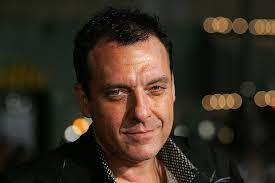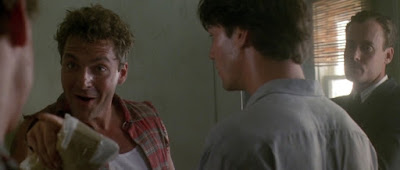Tom Sizemore came from Detroit of which America’s travel laureate Anthony Bourdain said, “I think it’s one of the most beautiful cities in America—still. The same incompetence and neglect that led to its current state of affairs has, at least, left us with a cityscape that even now, taunts us with the memories of our once outsized dreams.” It speaks to a certain duality possessed by the Motor City, a kind you could see in Sizemore too. His father was a Harvard man and philosophy professor, but two of his uncles got caught up in drugs and crime, both dying from tragic causes at least partially related to heroin addictions. Sizemore expressed disbelief that his father never went the same route, and Sizemore himself both did and didn’t, getting a bachelor’s in theater right there in Detroit at Wayne State University, and then a masters in theater from Temple, before moving on to New York and eventually carving out an incredibly successful movie career repeatedly undone by his own drug abuse as well as both horrifying domestic abuse allegations and convictions. He was removed from a movie set in 2003, per The Hollywood Reporter, for molestation of an 11-year-old girl, though the family ultimately declined to press charges, and in the same year was sentenced to six months in jail for physical abuse of then-girlfriend Heidi Fleiss, just a small sliver of the mess he made of his life, a life that ended last Friday at the age of 61 after a brain aneurysm due to a stroke. He did not merely have some troubles, so to speak, he left considerable emotional and physical wreckage in his wake, even as he taunts us with the memories of his outsized acting talent.
Sizemore excelled at portraying live wires. He could activate this savage glint in his eye and adopt this frantic but vitriolic edge to his voice that could stop a movie in its tracks, like Kathryn Bigelow’s “Point Break,” where as an undercover cop dressing down Agent Johnny Utah (Keanu Reeves) for ruining all his work Sizemore erupts. “I’ve been working on these fuckers for three months!” he hollers. And then repeats: “Three months!” On the second “three months,” in reverse shot, you can practically see the moment when Sizemore’s spittle hits Reeves in the face. In Martin Scorsese’s “Bringing Out the Dead,” where the typically madcap Nic Cage was tasked with underplaying, it is Sizemore who goes purposely over the top, playing his ambulance driver in the key of maniacal insomnia. With Sizemore at the wheel, you truly feel as if you never know where things will end up. That air, though, could cut both ways, and in a bit part in Tony Scott’s “True Romance,” he is so unhinged, so voluble, for no real reason related to the character, that it’s not simply cringe; it is legit uncomfortable. “Tom,” you honestly want to ask him, “are you ok?”
Through the prism of time, it’s impossible not to feel something is amiss, to see this as foreshadowing for a career that following considerable success in the 90s and early aughts would come undone from unrelenting and often public battles with substance abuse, and that even after various stints in rehab, resulted in frequent, if frequently forgotten (forgettable), work. I saw one of the movies from that period, 2014’s “The Age of Reason,” if only because its directors emailed me and asked if I’d watch. I get those emails all the time and ignore them and can’t recall what made me pay attention to this one; perhaps it was Sizemore himself. In a small role, he turns frighteningly, believably violent in the face of his own failures. It felt personal.
Sizemore, though, did equally commendable work when he tamped down that hot-tempered energy, or when he deployed it with shrewd judiciousness, as he did in Steven Spielberg’s “Saving Private Ryan,” playing the rock steady Sgt. Mike Horvath to the shaking hands of Tom Hanks’s Capt. John Miller. Only when a kind of mutiny briefly beckons does that familiar force of nature fire briefly ignite in his eyes. In Ridley Scott’s “Black Hawk Down,” as the commanding officer of a Humvee column under incessant fire during the Battle of Mogadishu, Sizemore projected believable encouragement in standing amid so many whistling bullets with gruff nonchalance. The menace he gives one of the heavies of Carl Franklin’s magnificent neo-noir “Devil in a Blue Dress” is so low-key that it makes racism feel like the most natural thing in the world.
Sizemore, though, was never better than he was in Michael Mann’s “Heat,” as Michael Cheritto, one of four high-tech, savvy, and successful armed bank robbers. Just in the way he says that one word that unwittingly sparks the quartet’s downfall – “slick” – he projects attitude and intimidation, though in a scene at dinner with his girlfriend, he projects a kind of giddy boyishness, almost like someone still on the edge of growing up. Indeed, that all comes to head in Sizemore’s finest moment, when he is forced to decide whether he will partake in the last robbery or walk away. If before he could shut someone down with a mere tilt of his head, here Sizemore lets every bit of tough guy bravado drain from his face, virtually begging the gang’s ringleader Neil (Robert DeNiro) to tell him what to do. When Neil won’t, Michael goes on something like a split-second emotional journey ending in an unforgettable devil may care cackle that is the false self giving way to the true self, quite possibly in more ways than one.





No comments:
Post a Comment